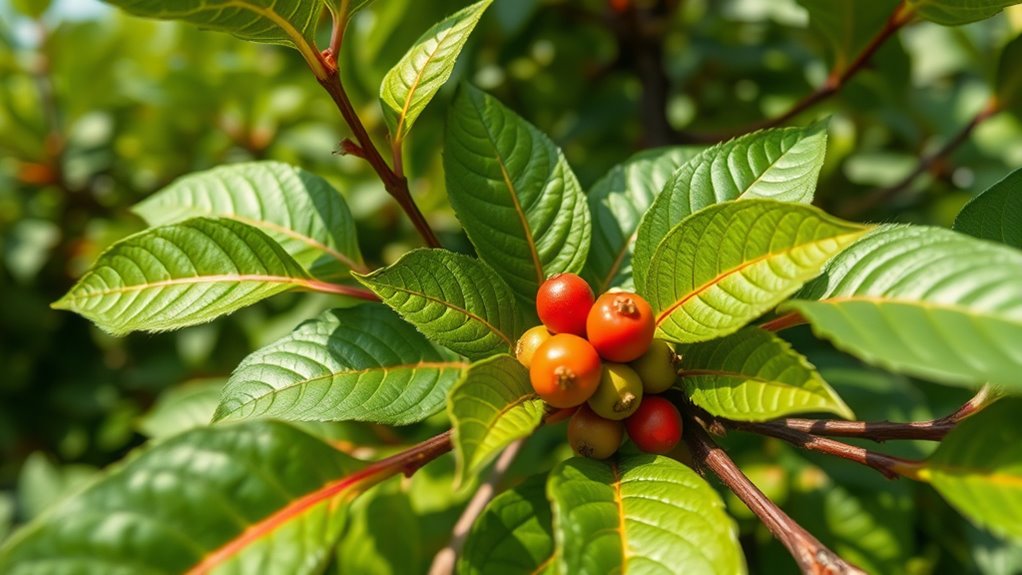Coffea eugenoides, a wild Ethiopian coffee species, holds overlooked potential to restore flavor diversity and resilience in your coffee choices. Its unique genetics offer resistance to pests, diseases, and environmental stresses, making it essential for future cultivation. By capturing its rich diversity, breeders aim to develop coffees with vibrant flavors and higher sustainability. If you explore further, you’ll discover how this forgotten parent could transform the future of coffee farming and your cup.
Key Takeaways
- Coffea Eugenoides’s genetic diversity introduces unique flavor notes like fruity, floral, and spicy nuances, enhancing coffee’s overall profile.
- Its resilience traits can be harnessed through breeding to develop pest- and climate-resistant coffee varieties.
- Preserving Eugenoides helps maintain biodiversity, ensuring a broader genetic pool for future flavor innovation.
- Its traditional and cultural significance offers opportunities to reconnect indigenous knowledge with modern coffee cultivation.
- Overcoming cultivation challenges can unlock Eugenoides’s potential to diversify coffee flavors and improve sustainability.
The Origins and Characteristics of Coffea Eugenoides
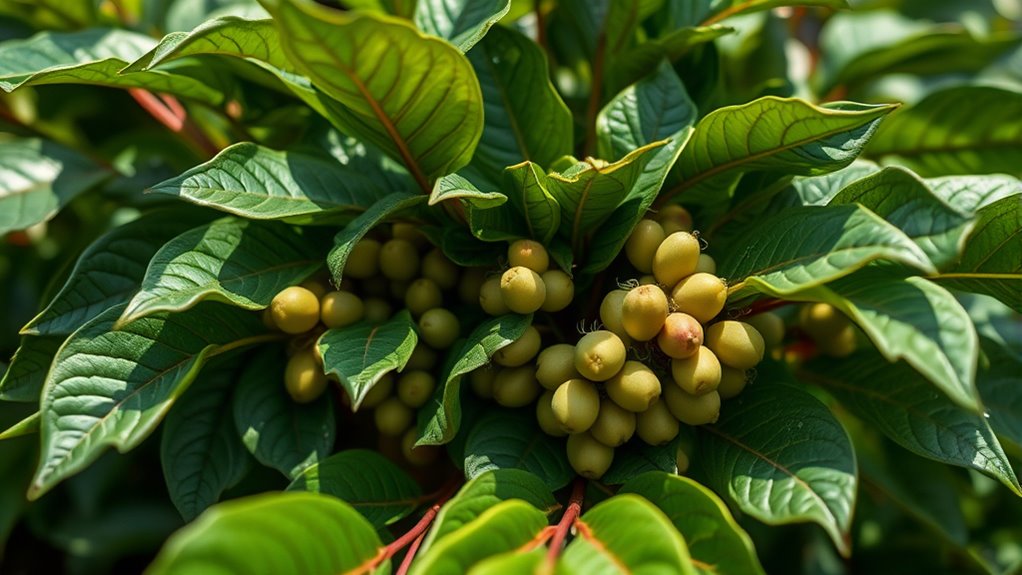
Coffea Eugenoides is a lesser-known coffee species native to the highlands of Ethiopia. Its wild genetic traits set it apart, offering a unique genetic pool that’s remained largely untouched by modern cultivation. These traits include resilience to pests and diseases, adaptability to harsh environments, and distinct flavor compounds. Its cultivar origins trace back to natural hybridization in Ethiopia’s diverse ecosystems, where it evolved independently from more common coffee varieties. Unlike cultivated species, Coffea Eugenoides grows wild, often in remote mountain forests. This genetic diversity could be crucial for future breeding, helping improve resilience and flavor profiles in cultivated coffee. Its origins and wild traits highlight its potential as a valuable genetic resource, offering traits that could benefit coffee cultivation worldwide. Additionally, the high genetic diversity of Coffea Eugenoides makes it an important candidate for breeding programs aimed at enhancing crop resilience and flavor variation.
Historical Significance and Underappreciation
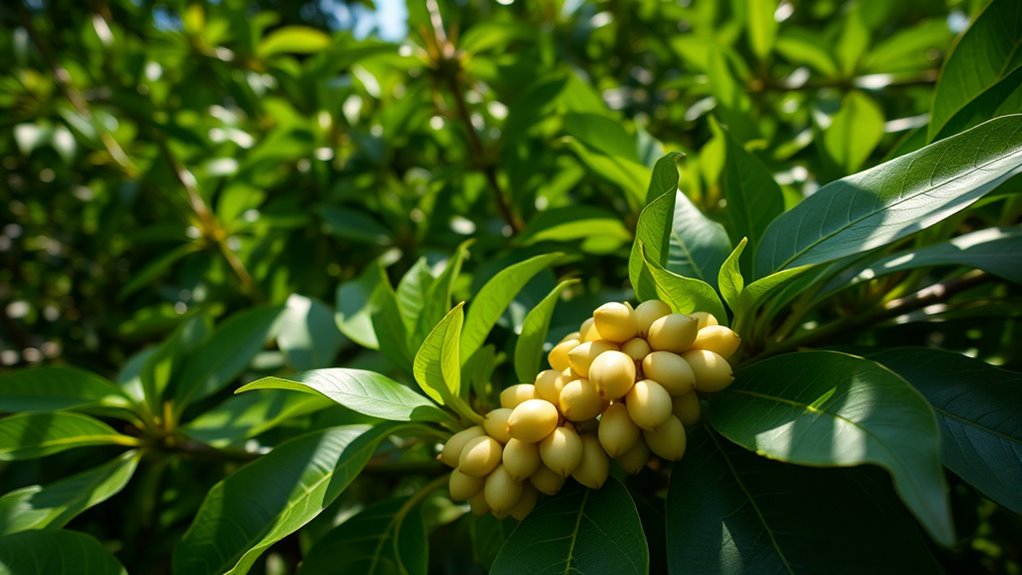
You might not realize how much Coffea Eugenoides holds an overlooked genetic heritage that could benefit modern coffee breeding. Its cultural connections have faded over time, leaving valuable knowledge lost. Recognizing its importance could unseal new opportunities for both preservation and innovation, especially by understanding its ancient origins and potential contributions to resilient coffee varieties.
Overlooked Genetic Heritage
Although often overlooked, Coffea eugenoides holds a critical place in the genetic heritage of coffee cultivation. Its genetic variation provides a rich resource for improving crop resilience against pests, diseases, and climate stress. Despite its importance, this species has been undervalued and underrepresented in breeding programs, leaving a gap in our understanding of coffee’s full genetic potential. Recognizing eugenoides’s contribution could help diversify cultivated coffee varieties, making them more adaptable and sustainable. By tapping into this overlooked genetic heritage, breeders can develop new cultivars that withstand environmental challenges while maintaining unique flavor profiles. Failing to appreciate its role risks narrowing genetic diversity, which is essential for the long-term health and resilience of global coffee production.
Lost Cultural Connections
Despite its significance in coffee’s genetic makeup, Coffea eugenoides has largely lost touch with its cultural roots, often overshadowed by more commercially prominent species. You might not realize that this species once held deep cultural importance for indigenous communities, serving as a crucial part of their heritage and traditional practices. Today, much of that ancestral knowledge has faded or been overlooked, risking the loss of valuable cultural preservation. Recognizing and reviving these connections can help honor indigenous contributions and maintain diversity beyond genetic traits. By valuing Coffea eugenoides’ historical significance, you contribute to safeguarding cultural identities and ensuring that future generations understand the full cultural context of coffee’s rich history. Restoring these links enriches both heritage and biodiversity, especially as cultural heritage plays a vital role in shaping sustainable agricultural practices.
Unique Genetic Traits and Adaptability
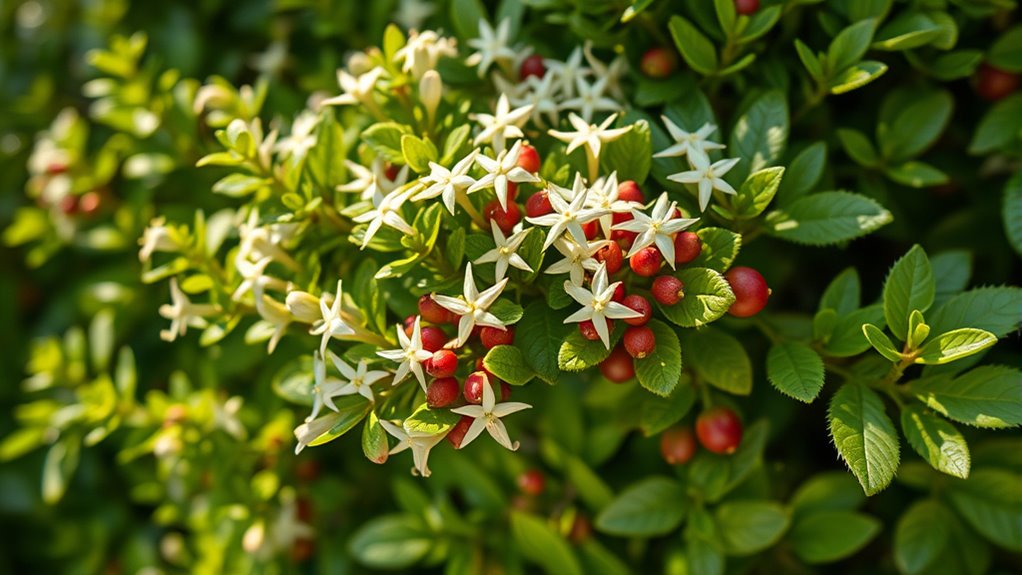
Coffea eugenoides exhibits several unique genetic traits that enable it to thrive in diverse and often challenging environments. Its genetic traits give it remarkable adaptability potential, allowing it to survive where many other coffee plants struggle. This resilience makes it a crucial resource for future breeding programs. You’ll find its traits include drought tolerance, disease resistance, and ability to flourish in low-nutrient soils. These qualities inspire hope for cultivating hardier coffee varieties amid climate change. Its adaptability potential can transform coffee cultivation worldwide. Additionally, understanding the environmental factors that influence its growth can guide sustainable cultivation practices.
Potential for Enhancing Coffee Flavor Profiles
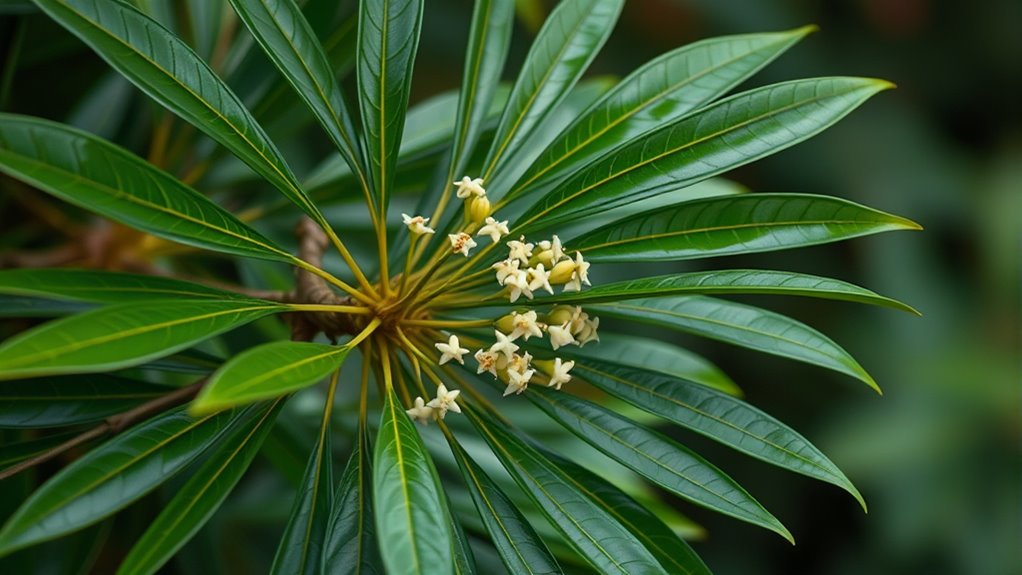
You have the chance to improve coffee flavor profiles by exploring the genetic diversity of Coffea eugenoides. Its unique traits can introduce new and complex taste notes to your brews. Harnessing this diversity could lead to richer, more distinctive coffee experiences. Additionally, understanding the plant’s background can help in developing cultivation strategies that preserve its unique qualities.
Genetic Diversity Boost
Enhancing the genetic diversity of Coffea eugenoides offers a promising pathway to improve coffee flavor profiles. By broadening its genetic pool, you increase genetic resilience, making plants better equipped to withstand pests and climate challenges. This diversity fuels flavor enhancement, *releasing* unique taste nuances that stand out in a crowded market. Introducing highly nutritious ingredients like chia seeds into coffee-related products could further support health benefits and flavor complexity.
- Feel the thrill of discovering new, complex flavors that excite your palate
- Experience the joy of resilient plants thriving against environmental stresses
- Witness the potential for richer, more nuanced coffee profiles
- Connect with the idea of safeguarding coffee’s future through genetic variety
- Embrace the possibility of revitalizing tired, monotonous flavors into vibrant sensations
Unique Flavor Contributions
Because of its rich genetic diversity, Coffea eugenoides offers a unique palette of flavor compounds that can elevate coffee profiles. Its genetic traits contribute to distinctive taste profiles, adding layers of flavor complexity often missing in mainstream varieties. When integrated into cultivation, Eugenoides can introduce subtle fruity, floral, or spicy notes that deepen overall flavor. This diversification allows you to craft coffees with more nuanced and vibrant taste experiences. By harnessing its unique flavor contributions, you can create beverages that stand out for their depth and originality. Ultimately, Coffea eugenoides has the potential to redefine flavor profiles, making your coffee more intriguing and memorable for consumers seeking complexity and uniqueness in every cup. Automation technology can assist in optimizing cultivation practices to preserve its genetic diversity and flavor potential.
Resistance to Diseases and Climate Resilience
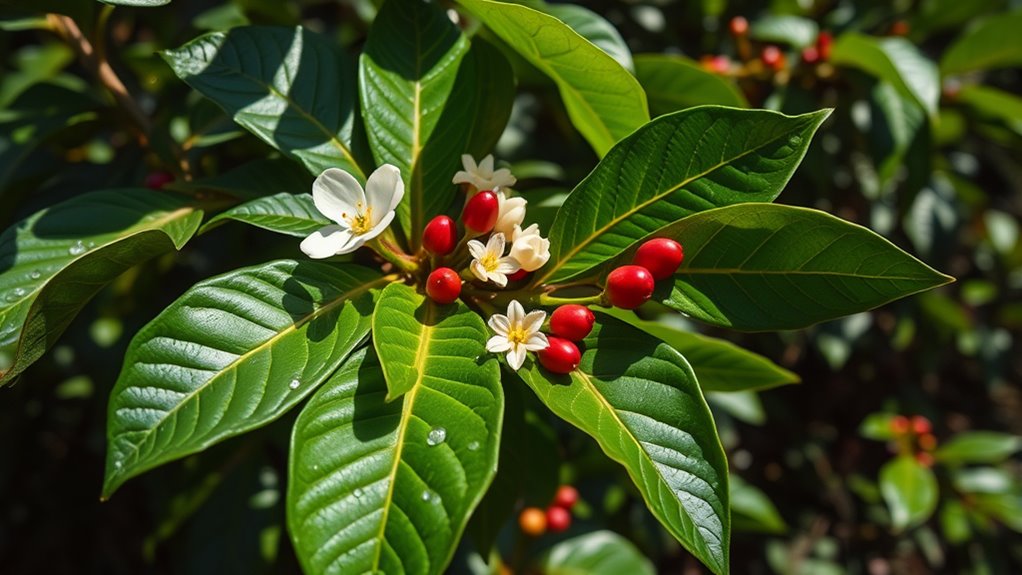
Coffea Eugenoides demonstrates notable resistance to common coffee diseases and shows resilience against climate variability. Its natural disease resistance helps protect crops from devastating pathogens, reducing reliance on chemical treatments. This resilience supports climate adaptation, allowing it to thrive in unpredictable conditions and hotter, drier environments. Moreover, its role in fostering inspirational quotes about fatherhood highlights its importance in sustainable agriculture and resilience strategies.
Coffea Eugenoides offers natural disease resistance and climate resilience for sustainable, reliable coffee production.
Imagine a future where your coffee plants withstand threats that once wiped out entire harvests. Visualize a crop that adapts seamlessly to shifting weather patterns, ensuring consistent quality and yield.
- Feel confident knowing your coffee can resist diseases that threaten others.
- Experience relief from constant worry about climate-related crop failures.
- Embrace sustainability with fewer chemical interventions.
- Trust in a plant built for resilience amidst climate change.
- Secure your coffee’s future by harnessing its innate disease resistance.
Challenges in Cultivating and Breeding With C. Eugenoides
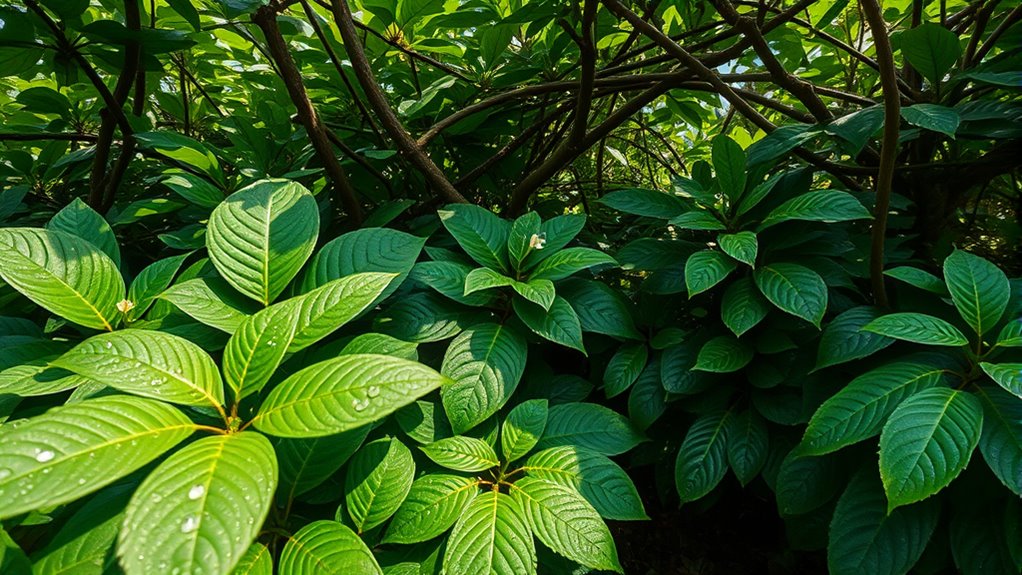
Cultivating and breeding with C. Eugenoides presents notable hybridization challenges and cultivation obstacles. Its unique genetics make crossing difficult, often resulting in low fertility or unpredictable traits. You might struggle with compatibility issues when trying to hybridize it with other coffee species. Additionally, C. Eugenoides requires specific growing conditions, which can be hard to replicate outside its native environment. These factors slow down breeding programs and limit large-scale cultivation. Here’s a quick overview:
| Challenge | Impact | Solution Ideas |
|---|---|---|
| Hybridization issues | Low success rate in crossing | Use advanced genetic tools |
| Climate sensitivity | Difficult to cultivate widely | Develop resilient varieties |
| Pest susceptibility | Increased crop loss | Integrated pest management |
| Slow growth | Longer breeding cycles | Optimize growth conditions |
| Limited seed availability | Reduced breeding options | Increase seed collection |
Furthermore, understanding the genetic diversity of C. Eugenoides can help develop more resilient strains and improve cultivation success. These hurdles mean you must carefully navigate both biological and environmental factors to access C. Eugenoides’ potential.
Current Research and Future Prospects
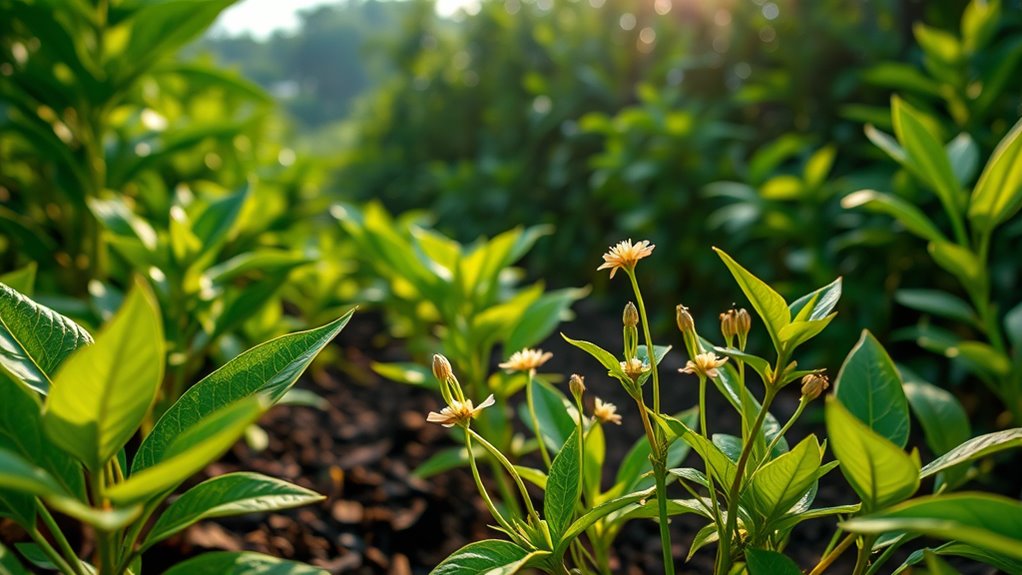
Recent research efforts are focused on overcoming the breeding and cultivation challenges associated with C. Eugenoides. Scientists are exploring genetic engineering techniques to enhance its resilience and flavor potential, aiming to release its hidden qualities. Conservation strategies play a crucial role, safeguarding wild populations that hold genetic diversity essential for future breeding. These efforts could lead to resilient coffee varieties that resist pests and climate change impacts. By integrating advanced science with conservation, researchers hope to revive and utilize C. Eugenoides effectively. Your excitement grows as new methods emerge, promising a future where flavor diversity is expanded and protected. This research fuels hope that C. Eugenoides will reclaim its place in coffee cultivation. Together, innovation and preservation will shape coffee’s future. genetic diversity is a vital aspect that supports sustainable breeding programs.
How C. Eugenoides Could Shape the Future of Coffee Cultivation
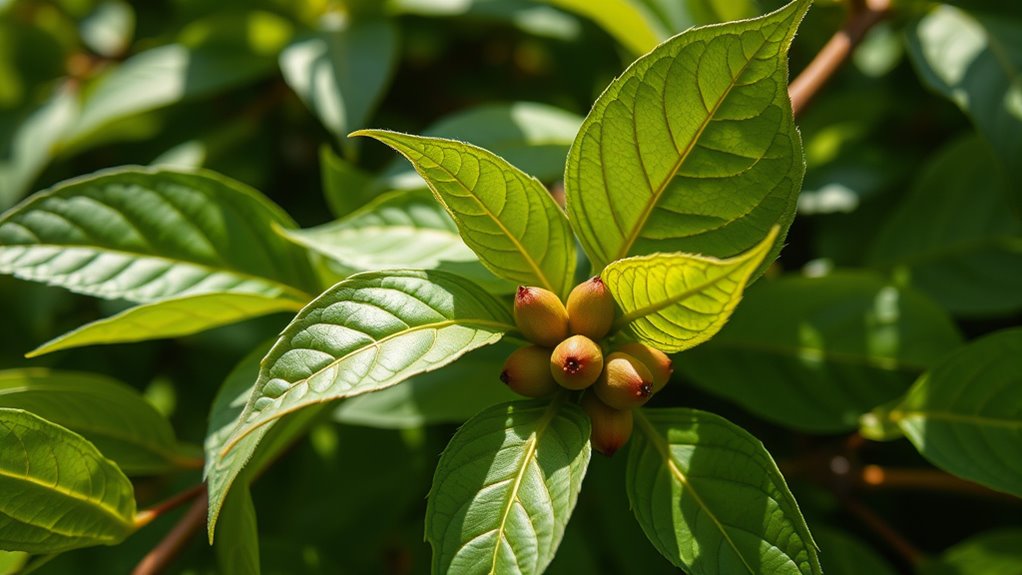
As innovative research reveals the genetic potential of C. Eugenoides, you could see a transformative impact on coffee cultivation. Breeding innovations using this species may introduce traits that enhance crop resilience, helping plants withstand pests, diseases, and climate stresses. C. Eugenoides’ natural adaptability makes it an ideal candidate for developing hardier coffee varieties. By integrating its genetic traits, you can cultivate plants that require fewer chemical inputs and are better suited to changing environmental conditions. This approach not only secures yields but also preserves flavor diversity by maintaining genetic variation. Ultimately, C. Eugenoides could revolutionize future coffee farming, making it more sustainable, resilient, and capable of thriving amid global challenges.
Frequently Asked Questions
Can Coffea Eugenoides Be Cultivated Outside Its Native Region?
You can cultivate Coffea eugenoides outside its native region if you consider its climate adaptability and soil requirements. It prefers specific temperature ranges and well-drained, rich soils. By replicating its native environment and providing proper care, you increase your chances of successful growth. So, with the right conditions, you might grow this unique coffee species beyond its original habitat, helping preserve flavor diversity and expand coffee cultivation options.
What Are the Economic Implications of Rediscovering C. Eugenoides?
You might find it fascinating that rediscovering C. eugenoides could boost market diversification, potentially increasing global coffee varieties by up to 20%. This could lead to more stable prices, reducing volatility caused by reliance on limited cultivars. Economically, embracing this species promises farmers new income sources, enhances flavor profiles, and fosters resilience against pests and climate change, ultimately strengthening the coffee industry’s stability and sustainability.
How Does C. Eugenoides Interact With Other Coffee Species Genetically?
You’d find that Coffea eugenoides interacts with other coffee species through genetic hybridization, which introduces new traits and enhances diversity. Its gene flow dynamics facilitate the transfer of beneficial genes, potentially improving flavor and resilience. By studying these interactions, you can better understand how C. eugenoides contributes to the genetic makeup of cultivated coffee, offering opportunities to develop superior hybrids and preserve genetic variation in coffee breeding programs.
Are There Any Known Health Benefits Associated With C. Eugenoides?
You might be interested to know that Coffea eugenoides has potential health benefits, thanks to its antioxidant properties. These antioxidants can help protect your cells from damage and support your immune system. While research is still emerging, consuming coffee derived from this species could offer immune support and contribute to overall health. Keep an eye on future studies to better understand its full benefits.
What Are the Conservation Statuses of Wild C. Eugenoides Populations?
They say “a stitch in time saves nine,” and that’s true for wild C. eugenoides populations. You should know their conservation statuses are concerning due to habitat loss and overharvesting. These factors threaten genetic diversity and pose significant conservation challenges. Protecting these wild populations is essential, as it helps preserve the genetic resources critical for future coffee breeding and flavor resilience. Act now to safeguard their survival and biodiversity.
Conclusion
You might be surprised to learn that Coffea eugenoides accounts for just 2% of wild coffee species, yet it holds the key to boosting flavor diversity and resilience. By exploring this forgotten parent, you could help revolutionize coffee cultivation, making your favorite brew more vibrant and sustainable. Embracing C. eugenoides means revealing untapped genetic potential—so next time you sip your coffee, consider the hidden legacy that could shape its future.
